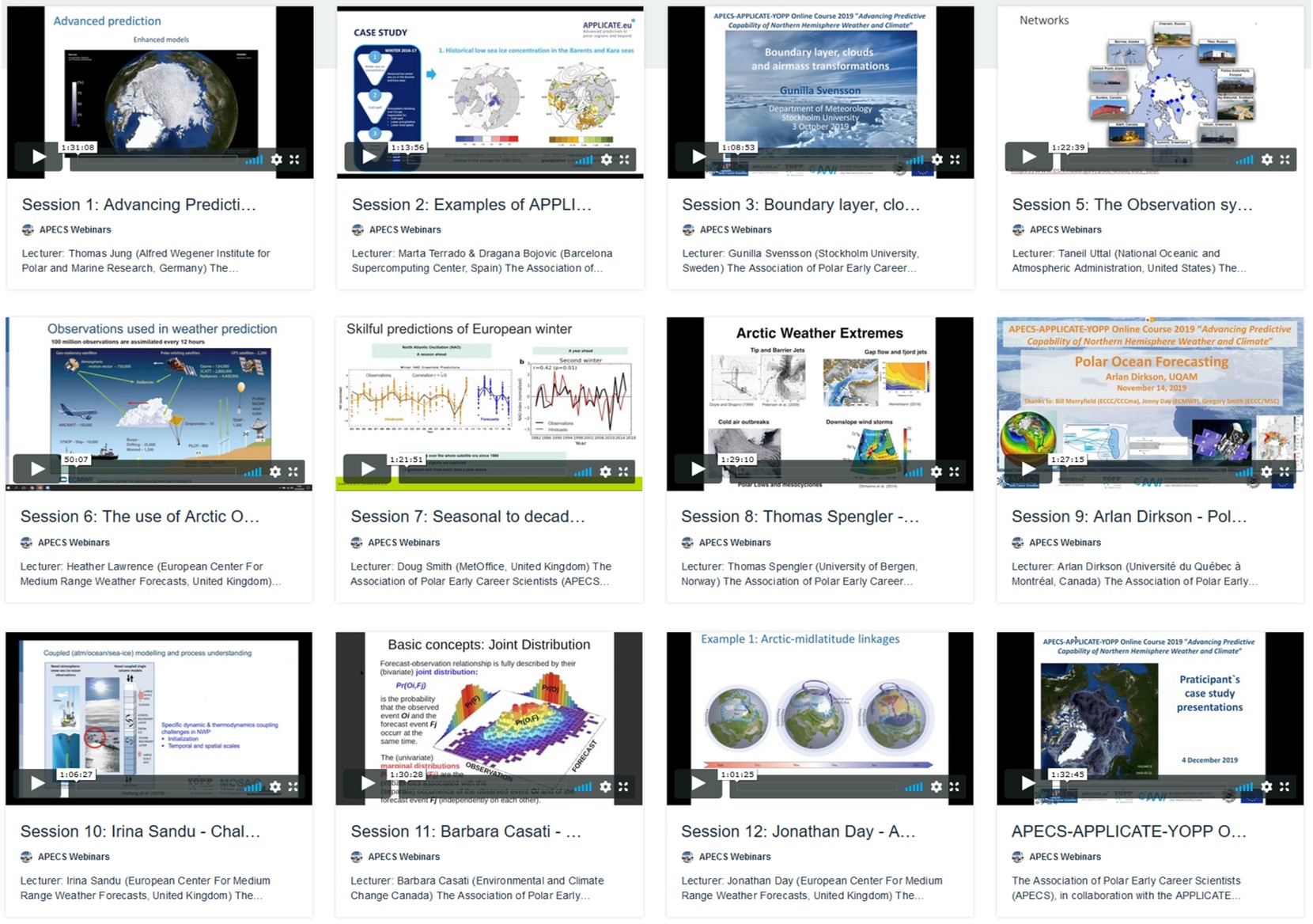Throughout fall 2019, APECS, the APPLICATE (Advanced Prediction in Polar regions and beyond: modelling, observing system design and LInkages associated with a Changing Arctic climaTE) project and the Year of Polar Prediction (YOPP) were running an open online course on "Advancing Predictive Capability of Northern Hemisphere Weather and Climate”.
Showcase of the webinar recordings that are available via the APECS Vimeo channel.
The course provided an overview of the state-of-the-art knowledge of Northern high-latitude weather and climate predictions and took place throughout fall 2019. It was designed for early career researchers (e.g., Master and PhD students, Postdocs) with a specific interest in Arctic weather and climate prediction and modelling.
Altogether 11 webinars were given by international experts once a week from September 19 to December 5, 2019. In preparation for each session, lecturers provided the top 3-5 scientific papers on their field and thus helped build a literature collection that is supporting the course. The agenda of the course including web links to the recorded sessions can be viewed on the course website. Each session is recorded and available online via the APECS vimeo channel.
Altogether 125 students, on average 39 for each session, followed several or all webinars and challenged the lecturers with detailed questions. The course participants were Master, PhD students and Postdocs from Europe, North and South America, Africa and Asia.
“The course has given opportunities to gain new knowledge on highly debated research topics from leading experts and the involvement of various stakeholders and policy makers.” (Course participant)
An important aspect of the course were Arctic extreme weather phenomena and engagement of stakeholders who are using weather and climate data and predictions in their daily operations. The APPLICATE project is investigating extreme weather events and its impact on society and economy in selected case studies. APPLICATE researchers introduced the course participants to why and how research can be communicated to different stakeholders through examples of these APPLICATE case studies. Learning about the format of case studies and how they are developed outlined the attractive and appreciated opportunity for the students to work as a group on their own case study. This practical task gave room for the student's own interests and creativity next to learning about this format of science communication. Six student groups were working on developing their case study across time zones and country borders. The topics of the student participant case studies were:
- Predicting the 2018 Heatwave and Forest Fires in Sweden;
- Future hazard risks from Greenland ice sheet mass loss: Potential consequences for mid-latitudes with a focus on the possibility of a tsunami occurrence in Scotland;
- The 2012 Record Low Sea Ice Minimum and its Effect on Arctic Biodiversity;
- Hydropower in Iceland and its sensitivity to climate anomalies;
- Influence of ENSO on Arctic Climate;
- Flushed away: Addressing the types and hazards of flash floods in the Arctic.
The work on the case studies was appreciated by the students as they enjoyed working with a comprehensive group of young, enthusiastic scientists from across the globe on how advanced weather and climate prediction knowledge can be applied to solve a practical problem and to make a difference in everyday life of society. Challenges such as kicking off the group project, communication across time zones and different backgrounds were confidently overcome by the student groups with the support of the course organisers and APPLICATE scientists, and resulted in the student case studies being successfully completed and presented in a dedicated webinar. The student participant case studies are available on the course website.
Offering such an online course was an opportunity for APECS, the APPLICATE and YOPP projects and researchers to share their work and inspire the next generation of Arctic climate and weather experts from around the globe. The strengths of the course are its efficiency, interactivity and structure through focused lectures providing cutting edge level of information that were combined with a practical task. Anybody regardless of their background could join the course and help build its cross-disciplinary character while all webinar recordings are forming a comprehensive and valuable resource and legacy of the APPLICATE and YOPP projects.
This course is supported through the APPLICATE project that received funding from the European Union’s Horizon 2020 research and innovation programme under grant agreement No 727862, the Year of Polar Prediction, the Association of Polar Early Career Scientists (APECS), the Alfred Wegener Institute, Helmholtz Center for Polar and Marine Research, and UiT The Arctic University in Tromsø. This article was written by Andrea Schneider and Gerlis Fugmann.




